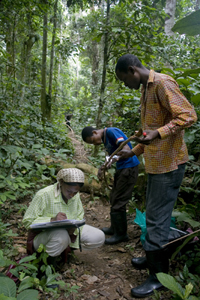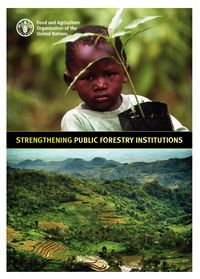Organizational development of forestry institutions  ©FAO/Giulio NapolitanoFunctioning institutions are a key ingredient to development, sustainable resource management, and societal adaptation to social, economic, and environmental change. In the forestry context, sector development depends on an institutional framework that comprises “rules of the game” as well as a number of organizations, public and private, with differing mandates, roles and functions. Within this broad institutional framework, public forest institutions (such as forestry departments and agencies) play many key roles and their performance is crucial for sector development. ©FAO/Giulio NapolitanoFunctioning institutions are a key ingredient to development, sustainable resource management, and societal adaptation to social, economic, and environmental change. In the forestry context, sector development depends on an institutional framework that comprises “rules of the game” as well as a number of organizations, public and private, with differing mandates, roles and functions. Within this broad institutional framework, public forest institutions (such as forestry departments and agencies) play many key roles and their performance is crucial for sector development.
Yet, the roles of forest institutions are rapidly changing due to changing demands on forests and their governance. Forests are increasingly recognised as key to solving pressing global issues such as climate change, energy scarcity, poverty, environmental degradation, biodiversity loss, food scarcity, and raw material supply. Consistent with its mandate, FAO has been working with countries to build the capacities of forestry institutions and enhance their contribution to sustainable forest management. Major activities of FAO related to capacity building and institutional adaptation include: - Organize capacity building and knowledge sharing events on issues related to the organizational development of forestry institutions (e.g., workshops, international dialogues, bilateral exchange visits;
- Conduct analytical studies at national/regional level that identify strengths and weaknesses of forestry institutions and provide necessary technical support for enhanced capacity building and institutional adaptation;
- Facilitate systematic analysis of critical forestry issues (e.g., forest policy development/conflict management in participatory forestry/financing SFM) in a country or region and help countries develop appropriate institutions;
- Support the development of regional tools, guidelines, and methodologies or approaches on selected management issues (e.g., inter-sectoral collaboration, and improved stakeholder participation, indicators for effective governance) and build capacities of forestry institutions for their effective implementation;
- Participate in projects that emphasize institutional change and adaptation;
- Assist particularly the forestry education, research, and extension organizations in their transition by enabling them with improved access to information and modern technology.
| 

